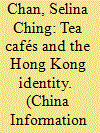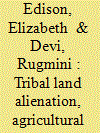| Srl | Item |
| 1 |
ID:
170190


|
|
|
|
|
| Summary/Abstract |
This article examines the meanings of caa caan teng (茶餐廳, local cafés) in Hong Kong and the implications of such cafés on the Hong Kong identity. It argues that the local café is a representation of Hong Kong culture because it reflects Hong Kong’s political, economic, and social developmental paths and mirrors the everyday life of its people. I investigate how the interaction of different immigrant cultures in Hong Kong has resulted in the invention of hybrid foods at the local café. These foods demonstrate hybridity as the transgression of boundaries through the negotiation of cultural differences among migrants, as well as those between migrants and colonialists. I argue that hybridity in local cafés reflects the power relations among the locals in Hong Kong, between locals and colonialists, and between locals and the new authorities in Beijing. Hybridity found in local cafés symbolizes the Hong Kong identity, as an entanglement between the multiplicity of Chinese ethnicities and the colonial modernity as characterized by flexibility, efficiency, choice, and diversity. These features differentiate the Hong Kong people from the colonialists and the mainlanders, thus constructing their identity and subjectivity, as former colonial subjects now living in the ‘periphery’ of the motherland.
|
|
|
|
|
|
|
|
|
|
|
|
|
|
|
|
| 2 |
ID:
163587


|
|
|
|
|
| Summary/Abstract |
This article, based on fieldwork, discusses the negative impacts of land alienation suffered by Adivasis in Attappady, a tribal block of Kerala in South India. Experiencing multiple alienations that have fundamentally affected their way of life, agricultural practices and food culture, tribals not only continue to suffer discriminatory treatment by non-tribal settlers, but also by state authorities’ restrictions of access to local forests and forest produce. These problems assume added significance as this ecologically important location in the Western Ghats of India is one of the eight ‘hottest hotspots’ of biological diversity in the world, while the traditional guardians of this environment have been completely disempowered. The article traces abuses of power in land alienation processes, analyses unequal power structures and argues that better appreciation of traditional tribal culture and its ecologically holistic approaches ought to inform policies for local sustainable development. This would help the tribals to safeguard their identity within the constraints of current conditions and enhance the prospects for sustainable preservation of the precious local natural resources and biodiversity.
|
|
|
|
|
|
|
|
|
|
|
|
|
|
|
|